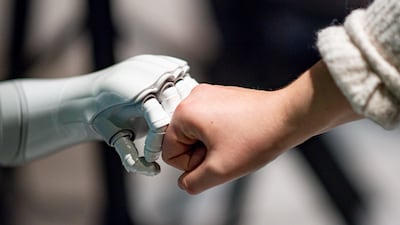Hundreds of nations have agreed to adopt common values and principles to ensure Artificial Intelligence is developed in an ethical fashion.
All 193 members of the United Nations Educational, Scientific and Cultural Organisation (Unesco), including the UAE, adopted the historical text on Thursday.
The world needs rules for artificial intelligence to benefit humanity,
Audrey Azoulay
Artificial intelligence is now woven into the tapestry of nearly every element of the modern world, including banking, travel and transport.
But the technology is also bringing unprecedented challenges, said Unesco.
"We see increased gender and ethnic bias, significant threats to privacy, dignity and agency, dangers of mass surveillance, and increased use of unreliable AI technologies in law enforcement, to name a few.
"Until now, there were no universal standards to provide an answer to these issues."
The new agreement aims to guide the construction of the necessary legal infrastructure to ensure the ethical development of this technology, said Audrey Azoulay, director general of Unesco.
"The world needs rules for artificial intelligence to benefit humanity," she said.
"The 'Recommendation on the ethics of AI' is a major answer. It sets the first global normative framework while giving States the responsibility to apply it at their level.
"UNESCO will support its 193 Member States in its implementation and ask them to report regularly on their progress and practices."
Environmentally friendly AI
The global agreement aims to provide a guide to ensure that digital transformation takes place without causing damage.
Nation states have agreed to ensure AI promotes human rights and contributes to the achievement of sustainable development goals, and to address the issues around transparency, accountability and privacy.
There are also action-oriented policy chapters in the agreement on data governance, education, culture, labour, healthcare and the economy.
One of its main calls is to safeguard data, going beyond what tech firms and governments are doing to guarantee individuals more protection by ensuring transparency, agency and control over their personal data.
The recommendation also explicitly bans the use of AI systems for social scoring and mass surveillance.
The text also attempts to ensure that AI will become a prominent tool in the fight against climate change and in tackling environmental issues.
In order to ensure this happens, those involved in developing AI should favour data, energy and resource-efficient methods, said Gabriela Ramos, Unesco’s assistant director general for social and human sciences.
"Decisions impacting millions of people should be fair, transparent and contestable," she said.
"These new technologies must help us address the major challenges in our world today, such as increased inequalities and the environmental crisis, and not deepening them."
Robots police the streets of Singapore
'Shakuntala Devi'
Starring: Vidya Balan, Sanya Malhotra
Director: Anu Menon
Rating: Three out of five stars
Ten tax points to be aware of in 2026
1. Domestic VAT refund amendments: request your refund within five years
If a business does not apply for the refund on time, they lose their credit.
2. E-invoicing in the UAE
Businesses should continue preparing for the implementation of e-invoicing in the UAE, with 2026 a preparation and transition period ahead of phased mandatory adoption.
3. More tax audits
Tax authorities are increasingly using data already available across multiple filings to identify audit risks.
4. More beneficial VAT and excise tax penalty regime
Tax disputes are expected to become more frequent and more structured, with clearer administrative objection and appeal processes. The UAE has adopted a new penalty regime for VAT and excise disputes, which now mirrors the penalty regime for corporate tax.
5. Greater emphasis on statutory audit
There is a greater need for the accuracy of financial statements. The International Financial Reporting Standards standards need to be strictly adhered to and, as a result, the quality of the audits will need to increase.
6. Further transfer pricing enforcement
Transfer pricing enforcement, which refers to the practice of establishing prices for internal transactions between related entities, is expected to broaden in scope. The UAE will shortly open the possibility to negotiate advance pricing agreements, or essentially rulings for transfer pricing purposes.
7. Limited time periods for audits
Recent amendments also introduce a default five-year limitation period for tax audits and assessments, subject to specific statutory exceptions. While the standard audit and assessment period is five years, this may be extended to up to 15 years in cases involving fraud or tax evasion.
8. Pillar 2 implementation
Many multinational groups will begin to feel the practical effect of the Domestic Minimum Top-Up Tax (DMTT), the UAE's implementation of the OECD’s global minimum tax under Pillar 2. While the rules apply for financial years starting on or after January 1, 2025, it is 2026 that marks the transition to an operational phase.
9. Reduced compliance obligations for imported goods and services
Businesses that apply the reverse-charge mechanism for VAT purposes in the UAE may benefit from reduced compliance obligations.
10. Substance and CbC reporting focus
Tax authorities are expected to continue strengthening the enforcement of economic substance and Country-by-Country (CbC) reporting frameworks. In the UAE, these regimes are increasingly being used as risk-assessment tools, providing tax authorities with a comprehensive view of multinational groups’ global footprints and enabling them to assess whether profits are aligned with real economic activity.
Contributed by Thomas Vanhee and Hend Rashwan, Aurifer
UAE currency: the story behind the money in your pockets
SERIES SCHEDULE
First Test, Galle International Stadium
July 26-30
Second Test, Sinhalese Sports Club Ground
August 3-7
Third Test, Pallekele International Cricket Stadium
August 12-16
First ODI, Rangiri Dambulla International Stadium
August 20
Second ODI, Pallekele International Cricket Stadium
August 24
Third ODI, Pallekele International Cricket Stadium
August 27
Fourth ODI, R Premadasa Stadium
August 31
Fifth ODI, R Premadasa Stadium
September 3
T20, R Premadasa Stadium
September 6
First Person
Richard Flanagan
Chatto & Windus
Company%C2%A0profile
%3Cp%3E%3Cstrong%3ECompany%20name%3A%20%3C%2Fstrong%3EHayvn%3Cbr%3E%3Cstrong%3EStarted%3A%20%3C%2Fstrong%3E2018%3Cbr%3E%3Cstrong%3EFounders%3A%20%3C%2Fstrong%3EChristopher%20Flinos%2C%20Ahmed%20Ismail%3Cbr%3E%3Cstrong%3EBased%3A%20%3C%2Fstrong%3EAbu%20Dhabi%2C%20UAE%3Cbr%3E%3Cstrong%3ESector%3A%20%3C%2Fstrong%3Efinancial%3Cbr%3E%3Cstrong%3EInitial%20investment%3A%20%3C%2Fstrong%3Eundisclosed%3Cbr%3E%3Cstrong%3ESize%3A%3C%2Fstrong%3E%2044%20employees%3Cbr%3E%3Cstrong%3EInvestment%20stage%3A%20%3C%2Fstrong%3Eseries%20B%20in%20the%20second%20half%20of%202023%3Cbr%3E%3Cstrong%3EInvestors%3A%20%3C%2Fstrong%3EHilbert%20Capital%2C%20Red%20Acre%20Ventures%3C%2Fp%3E%0A
FIXTURES
Saturday, November 3
Japan v New Zealand
Wales v Scotland
England v South Africa
Ireland v Italy
Saturday, November 10
Italy v Georgia
Scotland v Fiji
England v New Zealand
Wales v Australia
Ireland v Argentina
France v South Africa
Saturday, November 17
Italy v Australia
Wales v Tonga
England v Japan
Scotland v South Africa
Ireland v New Zealand
Saturday, November 24
|Italy v New Zealand
Scotland v Argentina
England v Australia
Wales v South Africa
Ireland v United States
France v Fiji



